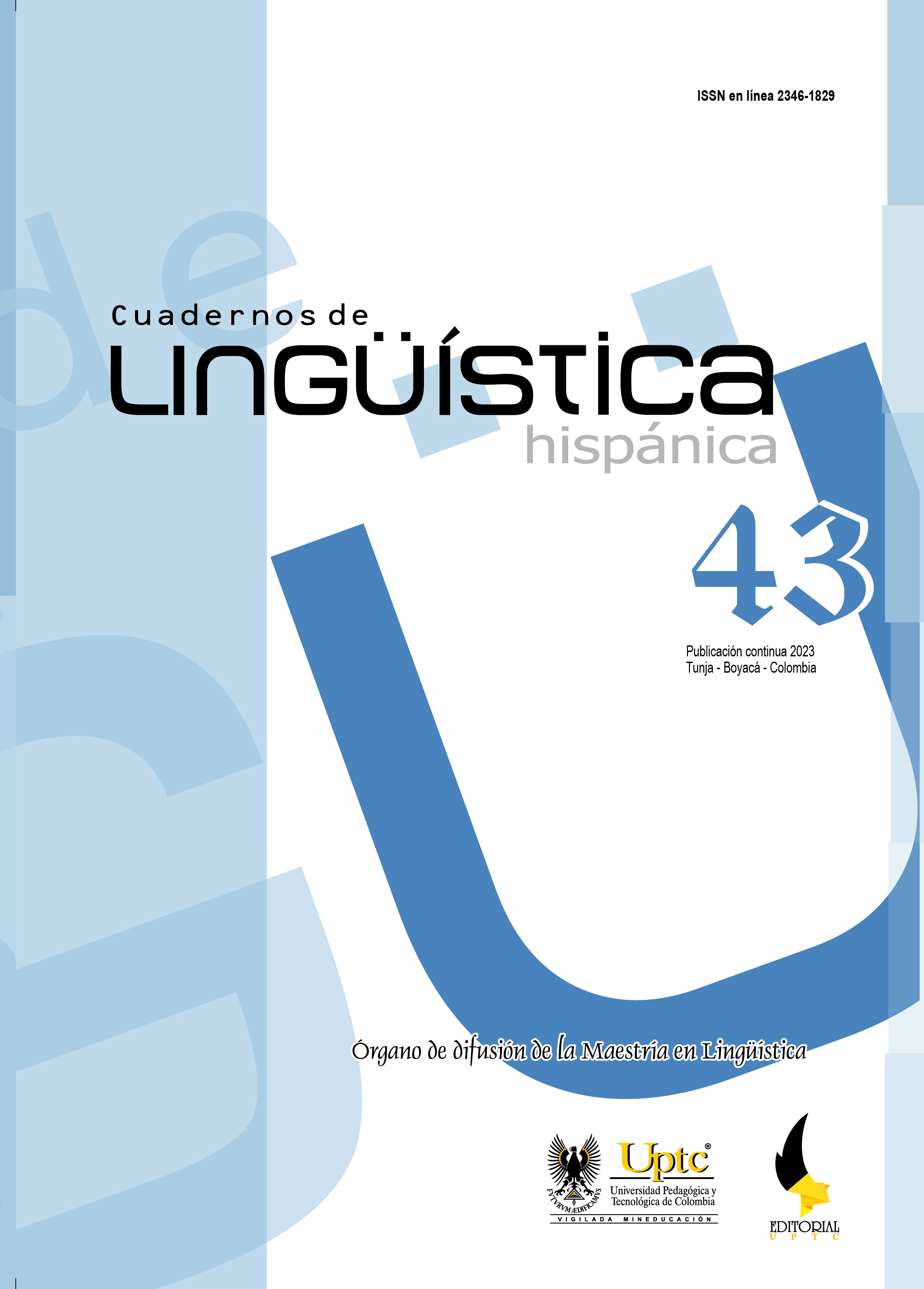Mobile Learning for Teacher Professional Development

Abstract
The results of an action research process conducted in 2022 at Santo Tomás University, Bogotá, Colombia, with 36 teachers, 12 USTA teachers, and 24 students teachers
from the Specialization in Pedagogy and Teaching of the Fundación Universitaria del Área Andina from Bogotá are presented in this article. Participants were divided into two groups based on the training they received in mobile learning strategies, especially those focused on English anguage communication skills development. The first and second phases of the research focused on diagnosis and the design of pedagogical strategies aimed at optimizing digital competencies in teachers to achieve learning objectives in English. The third phase, or evaluation phase, allowed for an analysis of the impact of implementing
the mobile learning model, which emerged as an innovative strategy and an opportunity for professional development for teachers.
Keywords
mobile learning, teacher training, digital skills, educational innovation
References
- Balanyà Rebollo, J. & De Oliveira, J. M. (2022). Elementos didácticos del aprendizaje móvil: condiciones en que el uso de la tecnología puede apoyar los procesos de aprendizaje. Edutec: Revista Electrónica de Tecnología Educativa, (80). https:// doi.org/10.21556/edutec.2022.80.2415 DOI: https://doi.org/10.21556/edutec.2022.80.2415
- Castillo-Retamal, F. (2021). Formación docente en TIC y su evidencia en tiempos de COVID-19. Revista Saberes Educativos, (6), 144. https://doi.org/10.5354/2452- 5014.2021.60715 DOI: https://doi.org/10.5354/2452-5014.2021.60715
- CEPAL & UNESCO. (2020). La educación en tiempos de la pandemia de Covid-19. Informe Covid-19. Repositorio CEPAL. https://repositorio.cepal.org/bitstream/ handle/11362/45904/1/S2000510_es.pdf
- Criollo-C., S., Guerrero-Arias, A., Jaramillo-Alcázar, Á., & Luján-Mora, S. (2021). Mobile Learning Technologies for Education: Benefits and Pending Issues. Applied Sciences, 11(9), 4111. https://doi.org/10.3390/app11094111 DOI: https://doi.org/10.3390/app11094111
- Demir, K., & Akpinar, E. (2018). The Effect of Mobile Learning Applications on Students’ Academic Achievement and Attitudes toward Mobile Learning. Malaysian Online Journal of Educational Technology, 6(2), 48-59. DOI: https://doi.org/10.17220/mojet.2018.02.004
- Díaz-Ramírez, M. I., Rodríguez-Silva, K. J., Mendieta-Ramírez, H. A., & Herreño-Contreras, Y. A. (2023). Implementación de estrategias de aprendizaje móvil y su efecto en la enseñanza del inglés. Cultura Educación Y Sociedad, 14(2), 25–48. Doi:10.17981/ cultedusoc.14.2.2023.02 DOI: https://doi.org/10.17981/cultedusoc.14.2.2023.02
- Flores, M. A., & Swennen, A. (2020). The COVID-19 Pandemic and Its Effects on Teacher Education. European Journal of Teacher Education, 43(4), 453-456. https://doi. org/10.1080/02619768.2020.1824253 DOI: https://doi.org/10.1080/02619768.2020.1824253
- Guy, R. (Ed.) (2009). The Evolution of Mobile Teaching and Learning. Informing Science Press.
- Hakim, M. A., Serasi, R., Efrizal, D., & Kurniawan, D. (2021). An Online English Teaching Module for CCU Subject: A Solution on the Pandemic COVID-19 Situations. Journal of Physics: Conference Series, 1933(1), 012082. https://doi.org/10.1088/1742- 6596/1933/1/012082 DOI: https://doi.org/10.1088/1742-6596/1933/1/012082
- Mangisch, G. C. & Mangisch Spinelli, M. D. (2020). El uso de dispositivos móviles como estrategia educativa en la universidad. RIED: Revista Iberoamericana de Educación a Distancia, 23(1). https://doi.org/10.5944/ried.23.1.25065 DOI: https://doi.org/10.5944/ried.23.1.25065
- Navarro, P. A. (2023). Aprendiendo inglés por medio de expresiones idiomáticas en comunidades de aprendizaje virtuales. Universidad Autónoma de Bucaramanga. http://hdl.handle.net/20.500.12749/20915
- Nuez, G., & Sánchez Suárez, J. A. (2014). Innovar para educar: uso de los dispositivos móviles en la enseñanza y aprendizaje del inglés. Historia y Comunicación Social, 19. https://doi.org/10.5209/revhics. 2014.v19.45001 DOI: https://doi.org/10.5209/rev_HICS.2014.v19.45001
- O’Malley, C., Vavoula, G.N., Glew, J., Taylor, J., Sharples, M., Lefrere, P., Lonsdale, P.,Naismith, L.M., & Waycott, J. (2003). Guidelines for Learning/Teaching/Tutoring in a Mobile Environment. HAL Open Science. https://hal.science/hal-00696244/ document
- Osorio Arrascue, E., Malpartida, J., Ávila, H. & Valenzuela, A. (2021) Aplicaciones móviles: incorporación en procesos de enseñanza en tiempos de COVID-19 Revista Venezolana de Gerencia, 26(93), 65-77. DOI: https://doi.org/10.52080/rvg93.06
- Rodríguez-Silva, K. J. & Mendieta-Ramírez, H. A. (2020). No me dejes en visto: uso de dispositivos móviles en la enseñanza del inglés. Revista Revoluciones, 2(2), 44- 58. https://doi.org/10.35622/j.rr.2020.02.004 DOI: https://doi.org/10.35622/j.rr.2020.02.004
- Romero-Rodríguez, J. M., Aznar-Diaz, I., Hinojo-Lucena, F. J., & Gómez-García, G. (2020). Mobile Learning in Higher Education: Structural Equation Model for Good Teaching Practices. IEEE Access: Practical Innovations, Open Solutions, 8, 91761-91769.
- https://doi.org/10.1109/access.2020.2994967 DOI: https://doi.org/10.1109/ACCESS.2020.2994967
- Schady, N., Holla, A., Sabarwal, S., Silva, J., & Chang, A. Y. (2023). How the COVID-19 Pandemic Eroded Human Capital and What to Do about It. World Bank. https:// openknowledge.worldbank.org/server/api/core/bitstreams/0199dad4-54a4-4d59- 998e a7775e4f2544/content
- Shoaib, M., Khan, S., Fitzpatrick, D., & Pitt, I. (2023). A Mobile E-learning Application for the Enhancement of Basic Mathematical Skills in Visually Impaired Children. Universal Access in the Information Society. https://doi.org/10.1007/s10209- 023-00990-3 DOI: https://doi.org/10.1007/s10209-023-00990-3
- Serradas, M. (2022). Aplicaciones móviles educativas para el abordaje de las dificultades de aprendizaje. Educ@ción en Contexto, 8(15), 116-139. https:// educacionencontexto.net/journal/index.php/una/article/view/174
- Soncco Salinas, R. B. (2022). Aprendizaje móvil y las competencias del idioma inglés en la educación superior. Comuni@cción, 13(2), 138-148. https://doi. org/10.33595/2226-1478.13.2.571 DOI: https://doi.org/10.33595/2226-1478.13.2.571
- UNESCO (2013). El Futuro del aprendizaje móvil: implicaciones para la planificación y la formulación de políticas. UNESCO. https://unesdoc.unesco.org/ark:/48223/ pf0000219637_spa?posInSet=4&queryId=8117669c-4bd8-4249-8d53- cbc5eb213ccf
- Winters, N. (2007). What is Mobile Learning. Big Issues in Mobile Learning, 7(11).
